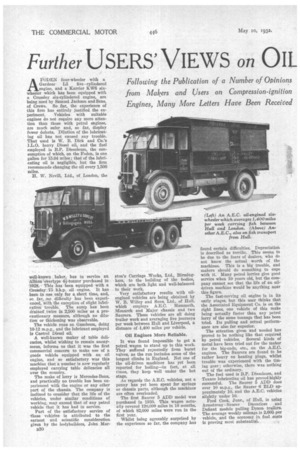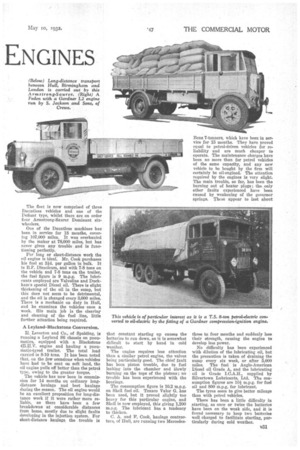Further USERS' VIEWS on OE
Page 44

Page 45

If you've noticed an error in this article please click here to report it so we can fix it.
ENGINES
Following the Publication of a Number of Opinions from Makers and Users on Compression-ignition Engines, Many More Leiters Have Been Received
AFODEN four-wheeler with a
Gardner L2 five cylindered engine, and a Karrier KW6 sixwheeler which has been equipped with a Crossley six-cylindered engine, are being used by Samuel Jackson and Sons, of Crewe. So far, the experience of this firm has entirely justified the experiment. Vehicles with suitable engines do not require any more attention than those with petrol engines, are much safer and, so far, display fewer defects. Dilution of the lubricating oil has not caused any trouble. That used is W. B. Dick and Co.'s l.L.O. heavy Diesel oil, and the fuel employed is B.P. Diesoleum, the consumption of which, on the Foden, is one gallon for 15.04 miles; that of the lubricating oil is negligible, but the firm recommends changing the oil every 1,500 miles.
H. W. Nevin, Ltd., of London, the
well-knovvn baker, lies in service an Albion 'overtype 4i-tonner purchased in 1028. This has been 'equipped with a Crossley 75 b.h.p. oil engine. It has been in use only for a short time and, so. far, .am difficulty has been experienced,-with the exception of slight lubricationtrouble. The sump has been diainedjwice in 2,500 miles as a precautionary measure, although no dilution or thickening was observable.
The vehicle runs on Gasoleum, doing 10-12 m.p.g., and the lubricant employed is Castrol Diesel oil.
A well-known maker of table delicacies, whilst wishing to remain anonymous, informs us that it was the first commercial concern to make use of a goods vehicle equipped with an oil engine, and so satisfactory was this machine that a number is now regularly employed carrying table delicacies all over the country.
The make of lorry is Mercedes-Benz, and practically no trouble has been experienced with the engine or any other part of the chassis. The company is inclined to consider that the life of the vehicles, under similar conditions of working, may exceed that of any petrol vehicle that it has had in service.
Part of the satisfactory service of these vehicles is attributed to the earnest and scientific consideration given by the bodybuilders, John Mar n30 stn's Carriage :Works, Ltd. Birmingham, to the building of the bodies, which are both light and well-balanced to their work.
Very satisfactory results with oilengined vehicles are being obtained by W. B. Willey and Sons, Ltd., of Hull, which employs A.E.C. Mammoth, Monarch and Major chassis and two Saurms. These vehicles are all doing trailer work and averaging five journeys per week between Hull and Liverpool, a distance of 1,400 miles per vehicle.
Oil Engines More Reliable.
It was found impossible to get a petrol wagon to stand up to this work. They suffered repeatedly from burnt valves, as the run includes some of the longest climbs in England. Not one of the oil-driven machines has yet been reported for boiling—in fact, at all times, they keep well under the hot stage.
As regards the A.E.C. vehicles, not a penny has yet been spent for springs or chassis parts, although the machines are often overloaded.
The first Saurer 5 ADD model was purchased in 1930. This wagon actually covered 126,000 miles in 18 months, of which 82,000 miles were run in the first year.
Whilst being agreeably surprised by the experience so far, the company has found certain difficulties. Depreciation is described as terrific. This seems to be due to the fears of dealers, who do not know the actual worth of the machines. This is a big trouble, and makers should do something to cope with it. Many petrol lorries give good service when 10 years old, but the company cannot see that the life of an oildriven machine would be anything near this figure.
The fast-revving oil engine is in its early stages, but this user thinks that the Associated Equipment Co. is on the right lines, one vehicle of this make being actually faster than any petrol lorry of the same tonnage that has been tried. Its pulling and actual performance are also far superior.
The attention given and needed has proved to be nothing like that required by petrol vehicles. Several kinds of metal have been tried out for the maker for the big-ends, etc., on the A.E.O. engines. The Saurers are found to be rather heavy on heating pity's, whilst trouble was experienced with the timing gear ; otherwise, there was nothing out of the ordinary.
The fuel used is B.P. Diesoleum, and Texaco lubricating oil has proved highly successful. The Saurer 5 ADD does over 10 m.p.g., the Sourer 6 BLD approximately 10, and the A.E.C. vehicles slightly under 10.
Fred Cook. Junr., of Hull, is using Armstrong. Sewer Dauntless and Defiant models pulling Dyson trailers. The average weekly mileage is 2,600 per vehicle, and the economy in fuel costs is proving most substantial. The fleet is now comprised of three Dauntless vehicles and one of the Defiant type, whilst there are on order four Armstrong-Saurer Dominant sixwheelers, One of the Dauntless machines has been in service for 18 months, covering 107,000 miles. It was overhauled by the maker at 78,000 miles, but has never given any trouble and is functioning perfectly.
For long or short-distance work the oil engine is ideal. Mr. Cook purchases his fuel at 3id. per gallon in bulk. It is B.F. Diesoleum, and with 7-8 tans on the vehicle and 7-8 tons on the trailer, the fuel figure is 9 m.p.g. The lubricants employed are Valvoline and Duck. hams special Diesel oil. There is slight thickening of the oil in the sump, but this does not seem to be detrimental, and the oil is changed every 3,000 miles. There is a mechanic on duty in Hull, and he examines the vehicles once a week. His main job is the clearing and cleaning of the fuel line, little further attention being required.
A Leyland-Blackstone Conversion.
IL Leverton and Co., of Spalding, is running a Leyland 86 chassis on pneumatics, equipped with a Blackstone 4D.11.V. engine and hauling a pneuMatic-tyred trailer. The total load carried is 8-10 tons. It has been noted that, on the few occasions when vehicles have had to be sent on soft land, the oil engine pulls off better than the petrol type, owing to the greater torque. • The vehicle has now been in commission for 14 months on ordinary longdistance haulage and beet haulage during the season. The oil engine would be an excellent proposition for long-distance work if it were rather more reliable, as there have been a few. breakdowns at considerable distances from home, mostly due to slight faults developing in the injection system. For short-distance haulage the trouble is that constant starting up causes the batteries to run down, as it is somewhat difficult to start by hand in cold weather.
The engine requires less attention than a similar petrol engine, the valves being particularly good. The chief fault has been piston trouble, due to fuel leaking into the chamber and slowly burning on the tops of the pistons; no trouble has been experienced with the
bearings. • The consumption figure is 10.2 m.p.g. on Shell fuel oil. Texaco Valor G. has been used, but it proved slightly too heavy for this particular engine, and Shell is now employed, this giving 1,200 m.p.g. The lubricant has a tendency to thicken.
C. A. and F. Cook, haulage contractors, of Hull, are running two Mercedes Benz 7-tanners, which have been in service for 15 months. They have proved equal to petrol-driven vehicles for reliability and are much cheaper to operate. The maintenance charges have been no more than for petrol vehicles of the same capacity, and any new vehicle to be bought by the firm will certainly be oil-engined. The attention required by the engines is very slight. The main trouble, so far, has been the burning out of heater plugs; the only other faults experienced have been caused by weakening of the governor springs. These appear to last about
three to four months and suddenly lose their strength, causing the engine to develop less power.
No difficulty has been experienced with dilution of the lubricating oil, but the precaution is taken of draining the sump every six week, or after 5,000 miles. The fuel is Anglo-American Diesel oil Grade A, and the lubricating oil is Grade I.C.A.H., supplied by Silvertown Lubricants, Ltd. The consumption figures are 10i m.p.g. for fuel oil and 800 m.p.g. for lubricant.
The tyres seem to give better mileage than with petrol vehicles.
There has been a little difficulty in starting, as once or twice the batteries have been on the weak side, and it is found necessary to keep two batteries well charged to facilitate starting, particularly during cold weather.




























































































